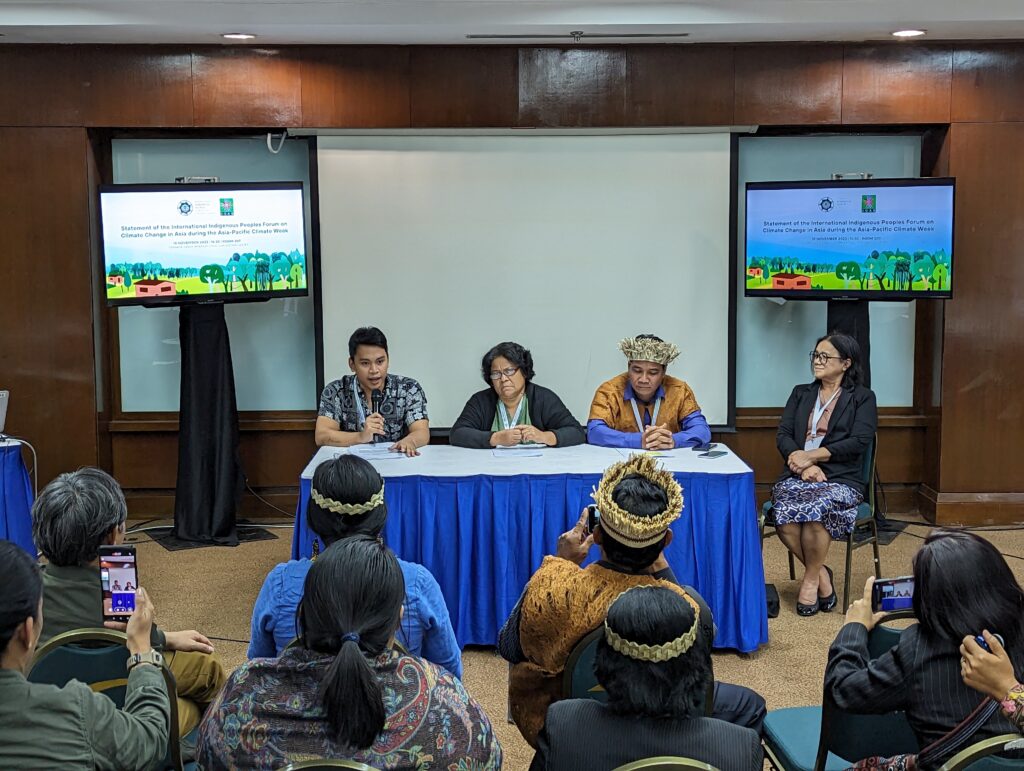PRESS RELEASE: Statement of the International Indigenous Peoples Forum on Climate Change in Asia during the Asia-Pacific Climate Week 2023

JOHOR BAHRU, Malaysia – The International Indigenous Peoples Forum on Climate Change (IIFPCC) delivered a statement today, 16 November 2023, calling for greater, more inclusive participation and engagement of Indigenous peoples in implementing climate solutions, and that such actions must respect the fundamental human rights of Indigenous Peoples.
The statement can be read in full here.
Composed of 50 indigenous representatives from seven different Asian countries, the IIFPCC in Asia is the representative body of all indigenous groups participating in the Asia-Pacific Climate Week (APCW) 2023 held in Johor Bahru, Malaysia from 13-17 November.
The IIFPCC asserts that climate discourse must ensure that Indigenous Peoples’ rights, knowledge, innovations and practices are recognised and respected, with their free, prior and informed consent. This must include their full and effective participation in decision-making in accordance with national legislation, the United Nations Declaration on the Rights of Indigenous Peoples and other international human rights instruments.
“To ensure that the rights, voices and perspectives of Indigenous Peoples are respected and protected, we should be treated as partners in climate change actions,” said Grace Balawag, the co-chair of the IIPFCC.
“Indigenous Peoples have contributed much to climate change solutions through our knowledge systems and practices, as stewards of the remaining biodiversity resources within our lands and territories. So we need to be engaged in these climate change processes as we talk about the future of our children and grandchildren,” Balawag added.
Before the formal start of the APCW sessions, the IIFPCC met every morning to collaboratively craft the statement and discuss intervention strategies in the day’s sessions. They also discussed pressing issues that are being put forward during the Climate Week sessions.
“The over focus of the APCW on carbon markets is a source of concern for Indigenous Peoples and Local Communities, there is so much that is not clear to the communities, who steward the forests from where carbon credits are expected to come from, and yet governments and the private sector are pushing for more deals, “ said Minnie Degawan an indigenous Kankanaey-Igorot activist from the Philippines.
“The clamor for more capacity building for communities to engage effectively in these discussions should be acted on immediately by governments, companies and civil society. Only then can high integrity carbon credits be generated,” Degawan added.
Some Indigenous participants also felt that the responses from state actors during the conference were severely lacking, and that only Indigenous-led events actually highlighted Indigenous issues.
“As a participant of APCW, I don’t feel happy participating in this program. Many issues from all over Asia were discussed and shared, yet none of the concerns from the Orang Asli community received any response from the government of Malaysia,” said Ismafadimi A/L Ismail, an Orang Asli youth.
“What good is the slogan ‘Malaysia Madani’ when we don’t feel it when attending international events like this?” He added.
The release of the statement has also been spurred on by the prior experiences of Indigenous representatives in the IIFPCC in prior events such as the Bonn Climate Change Conference last June 2023.
“The local experiences of Indigenous Peoples in climate mitigation and adaptation must be heard and amplified in international spaces,” said Asami Segundo, a youth member of the Ikalahan-Kalanguya Indigenous cultural community in the Philippines.
“For us Indigenous youth, being a climate activist is not by choice, it is a necessity for the survival of our homes, our people, and our entire cultures,” Segundo added.
Indigenous Peoples still continue to face systematic disadvantages when it comes to pushing their advocacies in international conferences such as the APCW. Aside from the significant expenses involved in traveling and participating, many Indigenous delegates are limited in their participation by the lack of adequate language interpretation options and the prevalent use of highly technical jargon and acronyms.
To forge effective solutions, the Indigenous Peoples caucus at the APCW stressed that it is imperative to embrace and elevate Indigenous perspectives, recognizing their pivotal role in promoting sustainability and environmental stewardship. Integrating their rich knowledge into climate strategies not only enhances adaptation efforts, but also safeguards diverse ecosystems for the benefit of all.
“Climate solutions can be found in the wisdom of the people of the land, in including Indigenous Peoples in these processes, we not only ensure sustainable climate solutions but we are also ensuring the survival of the earth we all call home,” said Tijah Yok Chopil, an Orang Asli elder.
“Climate change can only be addressed through real and equitable partnerships,” she added.
The IIFPCC will continue to position the concerns of Indigenous communities later this year at COP28 in Dubai where the first global stocktake, an overall evaluation of the global progress of climate action, will be concluded.
Hosted by the state government of Johor, Malaysia, the Asia-Pacific Climate Week 2023 is one of the four Regional Climate Weeks organized by the UNFCCC. Other Regional Climate Weeks have been previously held in Africa, the Middle East and North Africa region, and the Latin America and Caribbean region.



